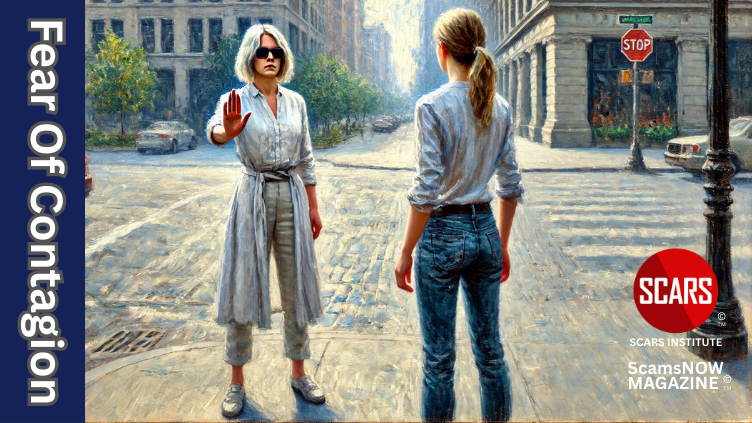Text Scams – New FCC Order Could Substantially Reduce Them
Author:
• SCARS Editorial Team – Society of Citizens Against Relationship Scams Inc.
Text Scams – The United States Federal Communications Commission Is Going After Them
On November 22, 2023, the Federal Communications Commission (FCC) adopted its Second Report and Order and Second Further Notice of Proposed Rulemaking, which outlines new measures to combat illegal text messages (text scams and illegal marketing texts.)
The Federal Trade Commission (FCC) has jurisdiction over text messaging between phones, and it is looking to use its power to tackle text scams.
What the FCC is Going to Do
- In order to significantly reduce text scams, the FCC is going to require terminating mobile wireless providers to block all texts from a particular number when notified by the Commission of illegal texts from that number.
- The FCC will codify that the National Do-Not-Call (DNC) Registry’s protections extend to text messages. Currently, they do not.
- The FCC will encourage providers to make email-to-text, a major source of illegal texts, a service that
consumers must proactively opt into. Meaning you do not have to, and will not have by default. - The FCC will close the lead generator loophole by making it unequivocally clear that comparison-shopping
websites must get consumer consent one seller at a time and thus prohibit abuse of consumer consent by such websites.
What the FCC Further Notice Would Do
- It will propose and seek comments on additional text-blocking options, including requiring originating mobile wireless providers to block texts from a particular number when notified by the Commission of illegal texts from that number or risk all of their texts being blocked.
- The FCC will seek comments on the current state of text authentication.
- The FCC will seek comments on the traceback process for texting and whether to adopt a requirement for mobile wireless providers to respond to traceback requests from the Commission and law enforcement.
- The FCC will propose and seek comment on requiring mobile wireless providers to make email-to-text an opt-in service.
What the Waiver Order Would Do
It would allow mobile wireless providers to use the Reassigned Numbers Database to determine whether a number has been disconnected after the date of illegal texts in the Commission’s notification to avoid blocking texts from reassigned numbers.
What This Means for Consumers
The FCC’s new measures are a significant step forward in the fight against illegal text messages. Consumers can expect to see a decrease in the number of unwanted, unsolicited, and illegal text messages they receive. Additionally, consumers will have more control over their text messaging experience, with new options for opting out of unwanted messages.
How It Will Better Protect Against Text Scams
The FCC’s new measures will help to protect consumers from text scams by:
- Blocking illegal text messages from reaching consumers’ phones
- Giving consumers more options for opting out of unwanted messages
- Making it more difficult for scammers to obtain consumer consent
Creating a Fairer Communications Landscape Without Abuse
The FCC’s new measures will help to create a fairer communications landscape by:
- Reducing the number of unwanted and illegal text messages
- Giving consumers more control over their text messaging experience
- Leveling the playing field for businesses by making it more difficult for scammers to abuse consumer consent
Summary
The FCC’s new measures are a welcome step forward in the fight against illegal text messages. These measures will help to protect consumers, reduce the number of unwanted messages, and create a more fair communications landscape.
More:
- Identify and Stop Scam/Spam Text Messages (romancescamsnow.com)
- U.S. FCC Imposes Record Penalty Against Transnational Illegal Robocalling Operation (scamsnow.com)
- Robocall Refunds From The FTC & State Of Florida $540,000 (scamsnow.com)
- Illegal Robocallers – People Hate Them (scamsnow.com)
- SCARS™ Scam Basics: Don’t Click Links In Unknown Text Messages! Ever! (romancescamsnow.com)
- Robocalls and Text Scams – How To Stop Them – A SCARS Guide (romancescamsnow.com)
- “Hello” Text Message Scams (romancescamsnow.com)
- Venmo Text Scam (romancescamsnow.com)
- Missed Package Delivery Messages, Calls or Voicemail (Flubot) Scams (romancescamsnow.com)
- Text Message Scam Warning (romancescamsnow.com)
- FluBot: Package Delivery Text Message Shipping Scam (romancescamsnow.com)
SCARS Resources:
- For New Victims of Relationship Scams newvictim.AgainstScams.org
- Subscribe to SCARS Newsletter newsletter.againstscams.org
- Sign up for SCARS professional support & recovery groups, visit support.AgainstScams.org
- Find competent trauma counselors or therapists, visit counseling.AgainstScams.org
- Become a SCARS Member and get free counseling benefits, visit membership.AgainstScams.org
- Report each and every crime, learn how to at reporting.AgainstScams.org
- Learn more about Scams & Scammers at RomanceScamsNOW.com and ScamsNOW.com
- Global Cyber Alliance ACT Cybersecurity Tool Website: Actionable Cybersecurity Tools (ACT) (globalcyberalliance.org)
- Self-Help Books for Scam Victims are at shop.AgainstScams.org
- Donate to SCARS and help us help others at donate.AgainstScams.org
- Worldwide Crisis Hotlines: International Suicide Hotlines – OpenCounseling : OpenCounseling
- Campaign To End Scam Victim Blaming – 2024 (scamsnow.com)
More ScamsNOW.com Articles
-/ 30 /-
What do you think about this?
Please share your thoughts in a comment below!
SCARS LINKS: AgainstScams.org RomanceScamsNOW.com ContraEstafas.org ScammerPhotos.com Anyscam.com ScamsNOW.com
reporting.AgainstScams.org support.AgainstScams.org membership.AgainstScams.org donate.AgainstScams.org shop.AgainstScams.org
youtube.AgainstScams.org linkedin.AgainstScams.org facebook.AgainstScams.org
TABLE OF CONTENTS
CATEGORIES
![NavyLogo@4x-81[1] Text Scams - New FCC Order Could Substantially Reduce Them 2023](https://scamsnow.com/wp-content/uploads/2025/04/NavyLogo@4x-811.png)
ARTICLE META
Important Information for New Scam Victims
- Please visit www.ScamVictimsSupport.org – a SCARS Website for New Scam Victims & Sextortion Victims.
- SCARS Institute now offers its free, safe, and private Scam Survivor’s Support Community at www.SCARScommunity.org – this is not on a social media platform, it is our own safe & secure platform created by the SCARS Institute especially for scam victims & survivors.
- SCARS Institute now offers a free recovery learning program at www.SCARSeducation.org.
- Please visit www.ScamPsychology.org – to more fully understand the psychological concepts involved in scams and scam victim recovery.
If you are looking for local trauma counselors, please visit counseling.AgainstScams.org
If you need to speak with someone now, you can dial 988 or find phone numbers for crisis hotlines all around the world here: www.opencounseling.com/suicide-hotlines
Statement About Victim Blaming
Some of our articles discuss various aspects of victims. This is both about better understanding victims (the science of victimology) and their behaviors and psychology. This helps us to educate victims/survivors about why these crimes happened and not to blame themselves, better develop recovery programs, and help victims avoid scams in the future. At times, this may sound like blaming the victim, but it does not blame scam victims; we are simply explaining the hows and whys of the experience victims have.
These articles, about the Psychology of Scams or Victim Psychology – meaning that all humans have psychological or cognitive characteristics in common that can either be exploited or work against us – help us all to understand the unique challenges victims face before, during, and after scams, fraud, or cybercrimes. These sometimes talk about some of the vulnerabilities the scammers exploit. Victims rarely have control of them or are even aware of them, until something like a scam happens, and then they can learn how their mind works and how to overcome these mechanisms.
Articles like these help victims and others understand these processes and how to help prevent them from being exploited again or to help them recover more easily by understanding their post-scam behaviors. Learn more about the Psychology of Scams at www.ScamPsychology.org
SCARS INSTITUTE RESOURCES:
If You Have Been Victimized By A Scam Or Cybercrime
♦ If you are a victim of scams, go to www.ScamVictimsSupport.org for real knowledge and help
♦ SCARS Institute now offers its free, safe, and private Scam Survivor’s Support Community at www.SCARScommunity.org/register – this is not on a social media platform, it is our own safe & secure platform created by the SCARS Institute especially for scam victims & survivors.
♦ Enroll in SCARS Scam Survivor’s School now at www.SCARSeducation.org
♦ To report criminals, visit https://reporting.AgainstScams.org – we will NEVER give your data to money recovery companies like some do!
♦ Follow us and find our podcasts, webinars, and helpful videos on YouTube: https://www.youtube.com/@RomancescamsNowcom
♦ Learn about the Psychology of Scams at www.ScamPsychology.org
♦ Dig deeper into the reality of scams, fraud, and cybercrime at www.ScamsNOW.com and www.RomanceScamsNOW.com
♦ Scam Survivor’s Stories: www.ScamSurvivorStories.org
♦ For Scam Victim Advocates visit www.ScamVictimsAdvocates.org
♦ See more scammer photos on www.ScammerPhotos.com
You can also find the SCARS Institute’s knowledge and information on Facebook, Instagram, X, LinkedIn, and TruthSocial
Psychology Disclaimer:
All articles about psychology and the human brain on this website are for information & education only
The information provided in this and other SCARS articles are intended for educational and self-help purposes only and should not be construed as a substitute for professional therapy or counseling.
Note about Mindfulness: Mindfulness practices have the potential to create psychological distress for some individuals. Please consult a mental health professional or experienced meditation instructor for guidance should you encounter difficulties.
While any self-help techniques outlined herein may be beneficial for scam victims seeking to recover from their experience and move towards recovery, it is important to consult with a qualified mental health professional before initiating any course of action. Each individual’s experience and needs are unique, and what works for one person may not be suitable for another.
Additionally, any approach may not be appropriate for individuals with certain pre-existing mental health conditions or trauma histories. It is advisable to seek guidance from a licensed therapist or counselor who can provide personalized support, guidance, and treatment tailored to your specific needs.
If you are experiencing significant distress or emotional difficulties related to a scam or other traumatic event, please consult your doctor or mental health provider for appropriate care and support.
Also read our SCARS Institute Statement about Professional Care for Scam Victims – click here
If you are in crisis, feeling desperate, or in despair, please call 988 or your local crisis hotline – international numbers here.
More ScamsNOW.com Articles
A Question of Trust
At the SCARS Institute, we invite you to do your own research on the topics we speak about and publish. Our team investigates the subject being discussed, especially when it comes to understanding the scam victims-survivors’ experience. You can do Google searches, but in many cases, you will have to wade through scientific papers and studies. However, remember that biases and perspectives matter and influence the outcome. Regardless, we encourage you to explore these topics as thoroughly as you can for your own awareness.

























![scars-institute[1] Text Scams - New FCC Order Could Substantially Reduce Them 2023](https://scamsnow.com/wp-content/uploads/2025/04/scars-institute1.png)

![niprc1.png1_-150×1501-1[1] Text Scams - New FCC Order Could Substantially Reduce Them 2023](https://scamsnow.com/wp-content/uploads/2025/04/niprc1.png1_-150x1501-11.webp)